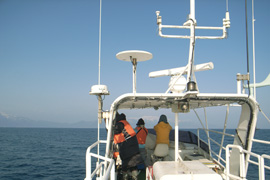The Mitsui & Co. Environment Fund
Introduction to Grant Projects
Mari KOBAYASHI, Director, Kita-no-umi Animal Center
Joint Japan-Russia research on the Northern Territories and Kuril Islands, compilation of data
Research grant
- Project Description
The Northern Territories and its surrounding seas are rich in biological diversity and notable as one of the few places in the world that still maintain a primeval ecosystem. The ecosystem of the Kurile Islands, on the other hand, while maintaining a high degree of continuity with those of the Northern Territories, Shiretoko and other nearby areas, is nonetheless undergoing changes amid global warming, oil pollution, oil field development and the like. In this research, we investigate the ecosystem of the Kurile Islands, gathering basic data on the current condition of that chain, an area for which little monitoring or data collection has been performed. We do so partly as an extension of a similar investigation for the Northern Territories. More specifically, we, as members of a group of specialists, survey the marine ecosystems around the Northern Territories, Sakhalin Oblast, Kamchatka Krai and elsewhere. We also examine satellite photographs, aerial photographs and the like to gather information about these marine environments and also compile a database of historical literature on the subject. We are to present our results at academic conferences or annual symposiums. In the conduction of this research, we are to seek collaborative arrangements with: in Japan, Tokyo University of Agriculture, Hokkaido University, the Ministry of the Environment, and the Ministry of Foreign Affairs; and, in Russia, the Ministry of Natural Resources and Environment (Moscow), Russian Academy of Sciences, the Kamachatka fishing ground regulatory bureau, and the Sakhalin Research Institute of Fisheries and Oceanography.
- Fields
- Preservation of biodiversity and ecosystem
- Grant year
- FY2007 Research Grants
- Grant term
- 3 years
April 2008 - March 2011
- Grant amount
- 25,200,000 yen
- Activity region
- Hokkaido periphery, Northern Territories, Sakhalin, etc.

Overview of the Organization

- Representative
- Mari KOBAYASHI, Director
- Profile
- Specialty field
Marine mammal studies
Affiliated academic societies
The Mammal Society of Japan; Japan Ethological Society; the Ecological Society of Japan; The Society for Marine Mammalogy
Background
Graduated in March 1995 from the School of Veterinary Medicine, Hokkaido University and in June 2001 completed a Ph.D. (veterinary science) from the Graduate School of Veterinary Medicine, Hokkaido University. In January 2003 to December 2015 took part in a Postdoctoral Fellow at the Japan Society for the Promotion of Science (Japan Wildlife Research Center, there conducting research on the modeling of primeval ecosystems of the Northern Territories and proposing a plan for their conservation and management). In April 2006 became a Professor at the Department of Aquatic Bioscience, Faculty of Bioindustry, Tokyo University of Agriculture. - Collaborating researcher
- Ohtaishi, Noriyuki; Chairman, Kita-no-umi Animal Center
- Research record
-
- (1) Marine mammals of Shiretoko Peninsula, a World Heritage site: Japanese mammals, Vol. 3., Tokai University Press
- (2) Symposium—management of Hokkaido marine mammals—"Man and beast, living together with the sea." Kita-no-umi Animal Center
- (3) Tracking Kuril harbor seals (Phoca vitulina stejnegeri) at Cape Erimo using a new mobile phone telemetry system. Animal Behaviour and Management
- (4) Characteristics of use patterns on drift ice of seals in February in the southern Sea of Okhotsk—Bulletin of the Shiretoko Museum
- (5) Evidence from Nuclear DNA Sequences Sheds Light on the Phylogenetic Relationetic Relationships of Pinnipedia: Single Origin with Affinity to Musteloidea. Zoological Science